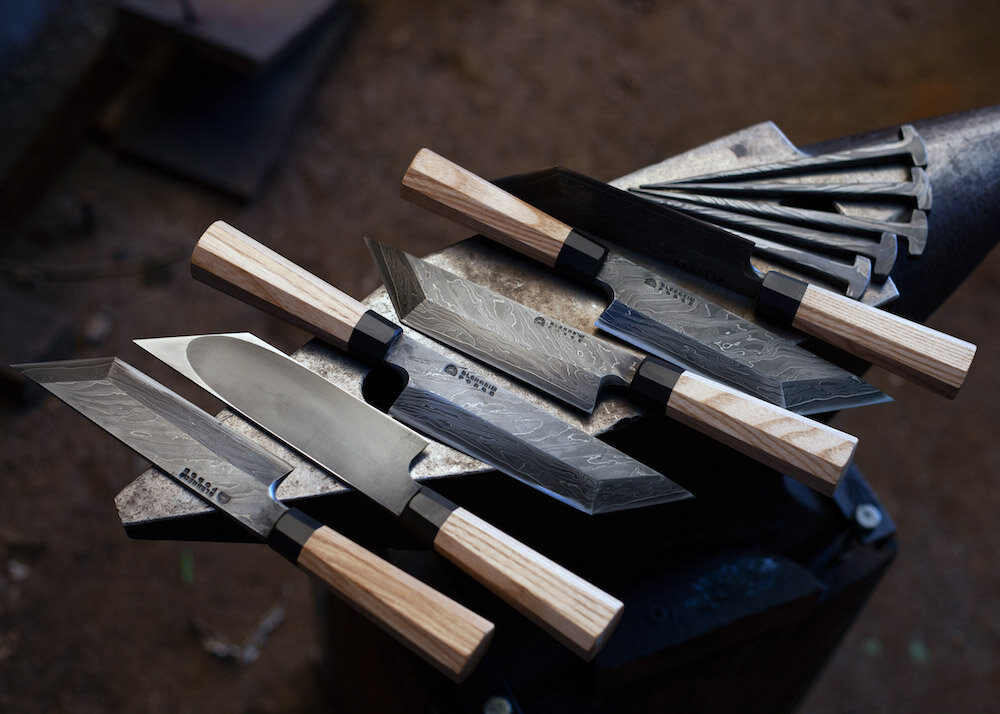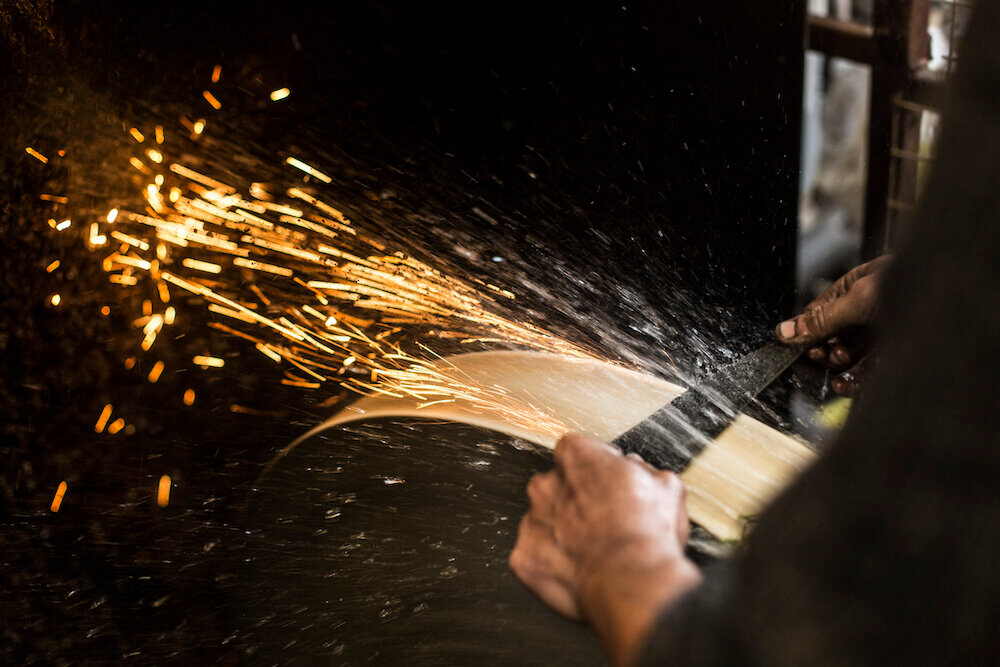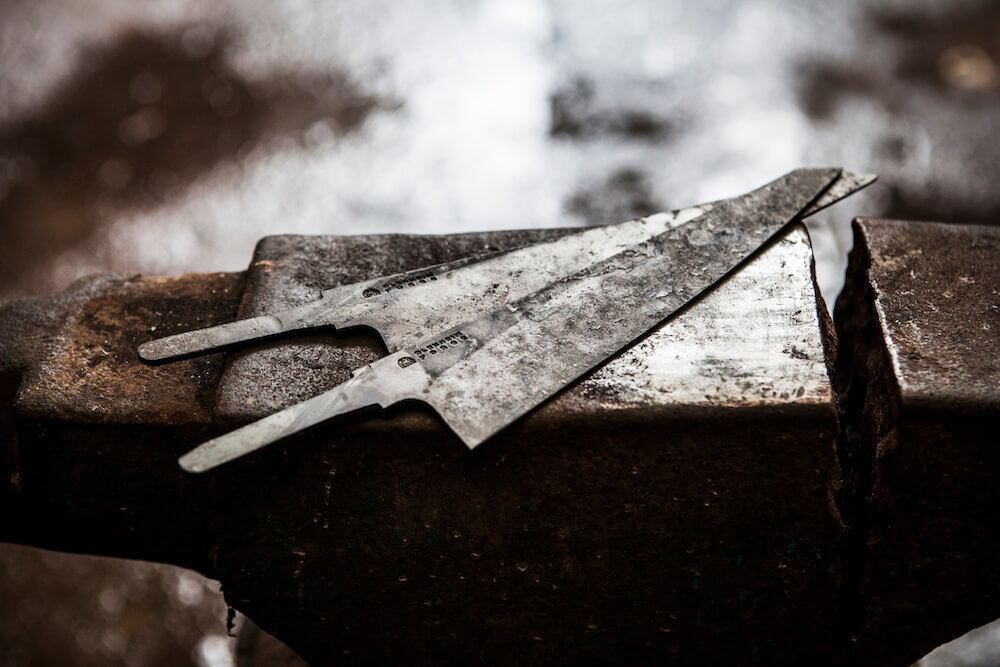James Ross-Harris, Bladesmith
BLENHEIM FORGE
PECKHAM, SOUTH-EAST LONDON
Before chef’s knives became the high-status tool of choice for home cooks, James Ross-Harris and Jon Warshawsky were tinkering away in their south London back garden, following the experimental building of a meat smoker and a hot tub with their first attempt at forging a blade. Initial success led to the founding of Blenheim Forge in a Peckham railway arch in 2014, and the addition shortly thereafter of machine engineer Richard Warner to the crew. Refining their processes as the business has grown, the trio now work Japanese Aogami “super blue” high-carbon steel into everything from eel knives and special-edition meat cleavers to all-rounders, with blades characterised by watermark-like, mottled patterns and ethically sourced handles of walnut and oak. As much works of art as functional tools, they have found favour with the likes of Nigella Lawson, Francis Mallmann and Knife author and aficionado Tim Hayward; even – perhaps most complimentary of all – high-end customers in Japan.
“We were all doing very different things before we started Blenheim Forge. I was working as a blacksmith/fabricator in the arch that is now our workshop, Rich was deep in the Australian outback building roads and Jon was working on a PhD in philosophy.
There has been a forge in our arch for over 40 years. The space becoming available was a big factor in us taking the plunge and deciding to try to turn our hobby into a viable business. It's rare to find a space so central that would be suitable for the kind of work we were interested in.
Peckham has a great community of people in small business and this network really helped us when we were starting out. Turning up at the pub covered in soot after a long day forging drew a lot of questions, and these conversations led to various introductions to chefs and journalists who really helped us refine our designs and spread the word about what we were up to.
There were two years between getting it right with our first knife and the successful second. I think the initial success condemned us to years of failure. If it hadn't worked the first time, we would have moved on to experiment with different techniques. The fact that we knew it was possible to fuse different metals together with the tools and equipment we had available meant that we had to keep trying to do it again. We still have a ‘fucked’ box of knives in our workshop. I don't really know why we keep hold of the blades that don't make it. Maybe one day we’ll melt them all down and make a batch of special ‘unfucked’ knives!
“turning up at the pub covered in soot after a long day forging drew a lot of questions”
James Ross-Harris
Our team has grown slightly and there are now six of us in the workshop, allowing the three of us founders [James, Jon and Rich] to focus on our special-edition blades, where we work small runs of more specialist pieces and undertake the entire production of a small batch. We generally share the work involved in the production of our standard range of knives, each of the founders doing their share of forging and grinding, although the others have now taken over some of the more specialist parts – Dan making and fitting handles, Menelick sharpening and Holly overseeing heat treatment, profiling and finishing. Having a team where different people have mastered their particular area has really helped us increase the number of blades we produce without compromising on the quality or consistency of what we make.
All of our knives go through a fairly similar process, be it one of our Classic range Petty knives or a limited-edition Damascus-steel Gyuto. Most of our steel comes from Japan. We work with a small steel mill there – Takefu Special Steel – to produce laminated metal to our particular specification. Japanese steel is currently the best available for our application. They have a long history of knife making and have really refined their steel-production techniques to serve this industry. We try to source the majority of our handle materials locally, and work with Bermondsey-based charity Goldfinch Furniture – they have a great programme, training young people who have fallen out of education to source and mill timber from trees within the M25.
Each stage of knife making has its tricky parts, but if the previous stage has been done well things are much easier. Generally, the work is only laborious or irksome if you know you could have made things much easier by not cutting corners earlier on… All of us agree that the forging is the most satisfying part of knife making. Squashing together layers of white-hot steel is really good fun!
Our process is a total combination of ancient craftsmanship and new technology. Our blades go from being different grades of steel that we have fused together using forge welding techniques that have been practiced for over 1,000 years, to being cut out using a computer-controlled plasma cutter, before being beaten to shape on a hammer and anvil.
Although we really appreciate and are inspired by traditional craft and techniques, I’ve also really enjoyed designing a production process that has enabled us to produce high-quality work efficiently and consistently. We are constantly trying to improve our production methods as well as our skills as individual craftspeople, so I do feel like a cross between an artisan/craftsman and a manufacturer.
“our process is a total combination of ancient craftsmanship and technology”
We are inspired by all sorts of things. Chefs using specialist knives to create amazing food, other craftspeople combining different materials and techniques to create beautiful objects and Japanese knife factories where they have refined their processes and techniques through years of practice and tradition. We’ve got to know a few of the UK’s most experienced bladesmiths, and becoming friends with Owen Bush, one of the best sword makers in the world, has been really helpful. Despite his work being very different to what we do, he has a huge amount of knowledge and experience and has always been willing to share it with us.
I’ve also been lucky enough to visit many different knife makers and factories in Japan. It's so inspiring to meet people who have been practicing their craft for so long. During our last visit, we met an 84-year-old man who had been forging axes the same way since he was a child. Watching him work was amazing.
If I was to give one piece of advice to a passionate cook looking to purchase quality knifeware on a budget, I would say to invest in one good one and learn how to care for and maintain it. Sharpening a knife takes a little practice, but once you have it down you'll have a knife that you can easily return to its original sharpness and should last a lifetime.
My desert island knife? Probably an Opinel. I think the simplicity and versatility of these little French folders is hard to beat and something to aspire to.”
For more about Blenheim Forge knives, visit blenheimforge.co.uk
Photography: Justin de Souza (portraits of James Ross-Harris); Eleri Naarismaa (eel knives, top, and Gyuto knife, opener); Chloë Winstanley (forging) and Andrew Hayes-Watkins (blades, below).
@blenheimforge



